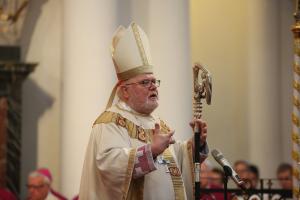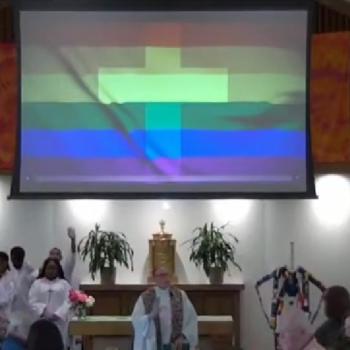Guest contributor: Todd Flowerday
Recently, Dennis identified docility as a trigger word. He cited one dictionary definition:
1: easily taught
a docile pupil
2: easily led or managed: tractable
a docile pony
Docile implies a predisposition to submit readily to control or guidance.
A few questions on my part:
- Does teaching in the Church always go in one direction, popes to Catholics, bishops to dioceses, clergy to laity? Do adults (and even insightful youth and children) have something to teach to those from one of the following groups: catechists, priests, theologians, Magisterium?
- Are adults open to identification with being “easily led” or “tractable” or likened to a pony, a beast of burden or of small children?
- Can we find a better word than docile?
To answer the last question first: yes.
A few days ago, I offered an invitation: let the bishops individually demonstrate docility, especially to their clergy and laity. Dennis, in turn, asked what I meant. I can offer one example from the Domestic Church.
When our daughter was young, we undertook the responsibility to adopt her and rear her to adulthood. Our family relationship began with a much larger portion of my wife and I teaching and forming her on matters great and small: how to read, how to behave in church, how to clean her room, how to sort her clothing, how to prepare basic meals and snacks, how to ride a bike, etc.. You get the idea.
One aspect of formation I think we succeeded at was the lesson on asking and granting forgiveness. When I was a boy, my parents didn’t always explain themselves. I was presented with directives, and I was expected to follow them. When I was about age ten or so, I noticed my parents made mistakes. Heaven help me if I pointed them out. My parents did not ask for forgiveness.
My wife and I did not adopt that policy. Very early, we were prepared to admit our mistakes to our daughter. It is not always easy to do this with a peer—a friend, a work colleague, or even a spouse.
Our adult daughter still lives with us, and she is the most prone to temper violations of the three of us. Her frequent—and probably constant and consistent practice—is to apologize. Her gestures are honest and meaningful, and it makes it very easy to forgive.
The lesson learned from parenting was that if I wanted to teach my child I had to demonstrate it. Not just talk about it. This is an example of formation: a person being introduced into a penitential/merciful way of being. Something different from my instruction teaching my daughter how to drive a stick shift. Apologies are best demonstrated. Driving schools are all about teaching.
Many Catholic bishops and clergy fail with regard to formation. Many act like my parents, expecting respect, if not demanding it. Maybe some clergy consider us a “tractable” laity. It is an attitude of a previous generation. In my experience, its effectiveness is far less than a more modern approach. A synodal style, if you will.
Duties of a Bishop
For those looking to the duties of bishops, I would counsel a review of sections 11 through 21 of the Vatican II document on the ministry of bishops (Christus Dominus). Some highlights include:
- “Since it is the mission of the Church to converse with the human society in which it lives, it is especially the duty of bishops to seek out (people) and both request and promote dialogue with them.” (13)
- “In exercising their office of father and pastor, bishops should stand in the midst of their people as those who serve.” (16)
- “They should regard the priests as sons and friends and be ready to listen to them.” (16)
Christus Dominus does not mention docility. Neither does the decree on the apostolate of the laity. Conciliar teaching seems to emphasize seeking people out, rather than expecting they will seek. Vatican II presumes we will be communicating with one another, ready to listen. A good approach—a docile one, if you will—would be bishops and priests asking lay people for a conversation.
We can’t escape from the misbehavior of bishops. The sad thing for the good guys is that they look exactly the same as the poor managers of sexual predators. Is the bishop with a good record really good, or is he just skilled at covering up bad news?
It seems to me that today the first move for any bishop is to request conversations of us. Getting past the politics would be good. I’ve never had a cleric ask me how I find Church teaching on sex and marriage. Lots of them preach it. But they’ve never been married. Never had kids.
If a bishop were to initiate the conversation, I would be happy to comply. I am sure other lay people would feel the same way. If bishops do not do this, are they afraid of us? Do they think we have no input on a sacrament to which they are spectators and we are the celebrants? Can they have a conversation and remain walking with us, side by side, just listening?
Scrolling back to docility, what definition are they wanting? Most importantly: are they willing to show people how it’s done?
Thank you!
Read The Latin Right’s other writing here.
Please visit my Facebook page and IM your questions (and follow my page) or topics for articles you would like covered.
Also, please subscribe my YouTube page for updates on upcoming articles.














